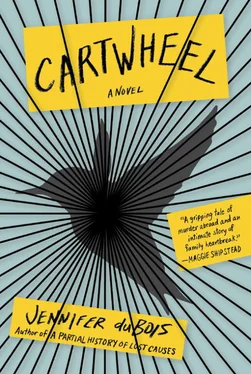After graduation, Eduardo began clerking in Córdoba. Around him, Kirchner was repaying the IMF loan; privatization was peeling away every expectation the people had ever had for anything beyond themselves in this world. Shared Dreams was investigated for corruption and the economy exploded overnight. Forgiveness was work, Eduardo told victims’ families—but so, then, was love, and deciding what was right, and defending it. Recusing yourself from judgment so you won’t be tainted by the aggressor’s sin is the same as turning away from empathy so you won’t be touched by the victim’s pain. And God did not shrink from either task, Eduardo often thought—though he didn’t say this to anyone. Eduardo would never have been fool enough to try to persuade anybody of the existence of God, just as he would never have been fool enough to try to persuade anybody of the existence of his own consciousness. No one can ever really prove their sentience externally—there’s no argument or syllogism that gets you there: The systems of measurement are too fatally implicated in the thing they’re trying to measure—and God, Eduardo thought, presented the same sort of mess. It was, at heart, a kind of epistemological Heisenberg uncertainty principle problem. But Eduardo’s morality did not require a belief in God. If anything, man’s compassionate justice was even more necessary in a secular universe. Because if not now, after all, then when? If not for this, after all, then for what?
After a few years, Eduardo was appointed the fiscal de cámara for Buenos Aires Province. Forgiveness is admirable, he told the judicial panels, but not when it is automatic; not when it is done because it’s the easy way to stay shallowly blameless. Eduardo developed instincts of great accuracy and precision about suspects, and these instincts led him to a streak of notable and just convictions. Standing outside the courtroom after one of them, he posed a question to the assembled press: What does it mean for a killer to deserve our empathy if a victim does not? It just means that we are lazy. It just means we want to be left alone.
But Eduardo did not want to be left alone; instead, he wanted to work, and to try. Trying was a modest thing to have at the center of one’s life. Nevertheless, it was going to save him. He wanted to try, and he wanted to keep trying—even now, with Maria gone. This meant he was not suicidal. He knew because he had looked it up.
Eduardo turned back toward his apartment building. He could still see it, all those blocks down the street, looking hazy and insubstantial in the mist. A mile away, Eduardo figured, the rain must be starting again.
That day, the emails were subpoenaed.
Lily Hayes and Katy Kellers were, it turned out, voluminous correspondents—they both kept track of the minute contours of their emotional lives, and this careful accounting produced several salient facts. First, it seemed that Lily had not much cared for Katy—in two emails and one Facebook message, all sent in early January, she had gone to some lengths to support her thesis that Katy was a “bore.” Second, it seemed that Katy and Lily had had a fight, or possibly several fights, toward the middle or at the end of February. This fact was not mentioned in Lily’s exchanges, but was described by Katy in a Google Chat exchange with one friend from home (who, alas, seemed already familiar with the situation, rendering the narrative fairly sketchy) and possibly referenced in a conversation with another (Sara Perkins-Lieberman: How are things with the roomie?? Katy Kellers: Ugggggggh :/). Finally, the third and most interesting piece of information revealed in the emails was that Katy, apparently, had been in a relationship. In an email written to that same Sara Perkins-Lieberman, she’d said: I’ve met someone. It feels kind of crazy.… We’re sort of sneaking around because I don’t think Lily would like it very much (she’s kind of histrionic), though maybe partly it just makes things more fun? I don’t know. I didn’t think I was really ready for anything yet, but now I sort of wonder . This revelation, of course, explained the condoms. And it seemed that Katy had indeed kept the relationship from Lily: In all of her extensive narrative journalism about their lives in Buenos Aires (which continued to cover Katy throughout the rest of February, though in increasingly fond terms), Lily never mentioned it. Katy’s relationship, apparently, really had stayed a secret. At least for a while.
In the afternoon, over coffee, Eduardo Googled “Lily Hayes.” It was a common name in the United States, it turned out, though it struck Eduardo as fussy and prim, an odd moniker for Me Generation parents to give to a child. Nonetheless, “Lily Hayes+Middlebury” yielded several hits. There was Lily Hayes dressed up as a green pepper for some children’s theater troupe, and there was Lily Hayes raving about the generosity of alumni donations in the school magazine, and there was Lily Hayes arguing in the Middlebury Campus —with a blend of self-righteousness and world vision totally unsullied by reality—for an immediate withdrawal of U.S. troops from Afghanistan. Next, Eduardo found Lily on Facebook: a Molière quote, a variety of subsexual poses, a loving catalog of reasonably challenging fiction. He scrolled down. He saw stern admonishments to sign petitions, flirtations with bearded and bespectacled young men, birthday wishes sent and received. It was certainly not the kind of trail that most of Eduardo’s suspects left in their wake. Eduardo did not believe that crime—murder, in particular—was ever inevitable. But with most defendants, you could track the way each misfortune had impelled the next; you could look at their lives and nearly reach out to trace the filigreed twists and turns that had deposited them, with shaking hands, before their victims and their fates. Most defendants Eduardo saw were broken. Lily Hayes—if she was guilty—had never been whole.
Eduardo scrolled down further. A few months back, Lily Hayes had posted a link to a blog. “I wrote a piece for my Intermediate Creative Writing class, imagining a crime,” she wrote, and fourteen people had “Liked” this statement, for reasons Eduardo could not fathom. He clicked on the link, which took him to what looked to be a mostly abandoned blog— Reveries , it was called, and underneath it were the words “feminist,” “artist,” “dreamer,” and “explorer”—and the top post was her imagined crime, creatively written, apparently, for a college course. The piece seemed to revolve around a jilted lover who goes back into the house of the woman who has betrayed him to steal an expensive necklace he has given her. Eduardo read with keen attention, feeling that he was watching a thing in the distance assume its shape. Underneath the florid writing, the girlish overreliance on adverbs, there was something troubling and emotionally askew—the same thing, he was almost sure, that he’d detected in the transcript from her interview. He read the piece’s ending. Then he read it again.
In my ire and haste, I have tripped the alarm. I must move with alacrity now. I grab the necklace swiftly. It is so beautiful. Its varicolored hues glitter dazzlingly in the light. I look at her sleeping peacefully there. I admire her swanlike neck of ivory. It is so innocent, so unsuspecting. I raise my knife in murderous wrath, but do not strike .
Eduardo printed out the story with the benumbed feeling of encountering astonishing good luck. It was significantly less than a written confession, of course, though it was hard to think of anything much closer.
But still, he was not sure.
Thursday was the judicial interrogation, to which Lily Hayes had submitted without a lawyer. Her father would be coming, apparently, and a U.S. consultant to the Argentine defense team and various private defense attorneys were being hired; these people, it was clear, had some money. Eduardo did not know why Lily had rejected the offers of a state-appointed lawyer. Perhaps it was due to a low opinion of the quality of Argentine state defenders, or a foolish calculation that this would make her look innocent, or an unusual though by no means unheard-of indifference to her own fate. Eduardo felt some sympathy for her. But he wasn’t going to talk her out of making her own strategic mistakes, if she wanted to make them.
Читать дальше












